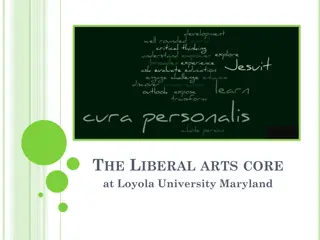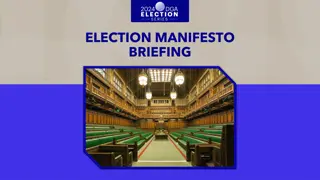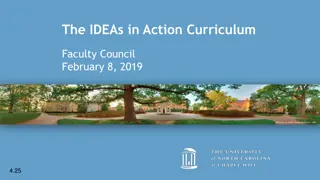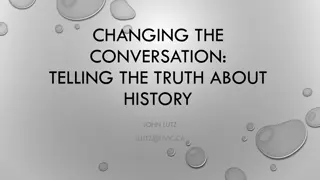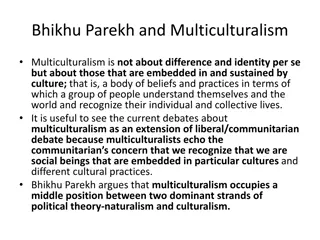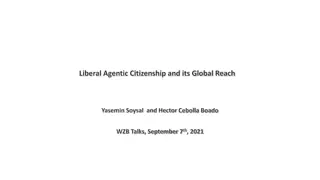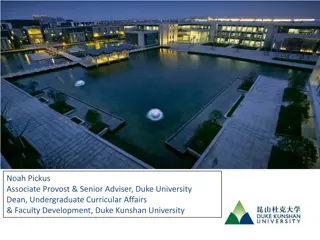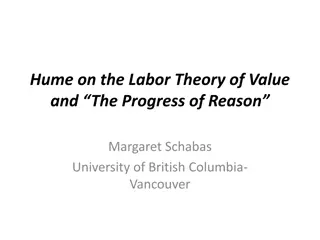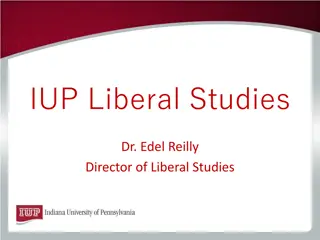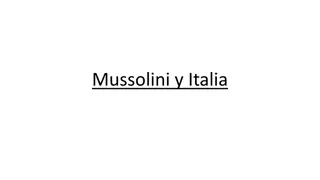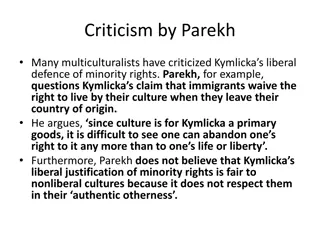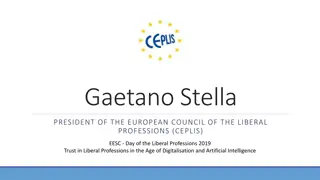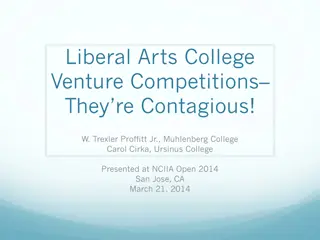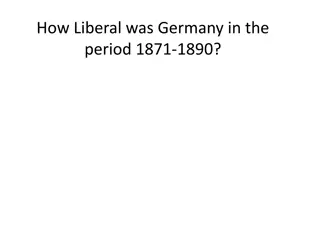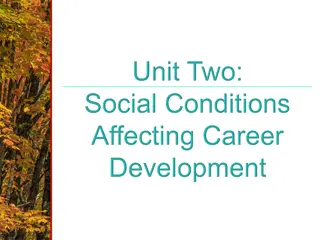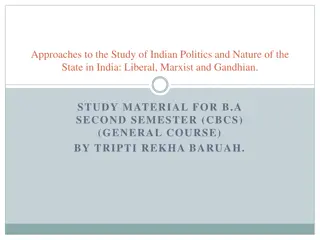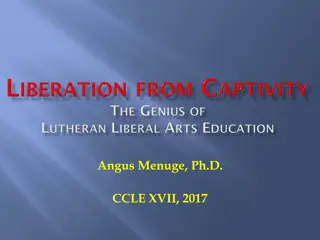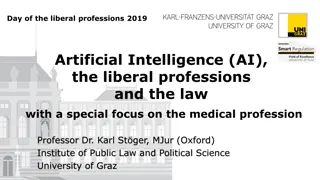Ginzburg Landau phenomenological Theory
The Ginzburg-Landau phenomenological theory explains superconductivity and superfluidity as distinct thermodynamic phases. It focuses on phase transitions characterized by singularities in specific heat at the transition temperature. Derived from BCS theory, it quantifies condensation energy, emphas
1 views • 38 slides
Crystal Field Theory in Transition Metal Complexes
Crystal Field Theory (CFT) explains the colors and magnetic properties of transition metal complexes. It focuses on the energy changes in d-orbitals of metal ions caused by surrounding ligands. This theory, developed in 1929, provides insights into the bonding interactions in complex compounds. The
10 views • 44 slides
Loyola University Maryland Liberal Arts Core Overview
The Liberal Arts Core at Loyola University Maryland emphasizes a well-rounded education through courses in Humanities, Social Sciences, Mathematical Sciences, and Natural Sciences. Students take 15 core courses in liberal arts, including writing, history, literature, language, philosophy, theology,
2 views • 19 slides
Understanding Social Learning Theory and the Power of Example
Social Learning Theory, introduced by Bandura, emphasizes learning through observation and modeling. It explores how individuals acquire behavioral dispositions, trial-and-error experiences, and the impact of stimuli in the environment. The theory focuses on the importance of attention, retention, a
1 views • 17 slides
Election Manifesto Briefing: Key Takeaways on Tax, Finance, and Crime Policies
Labour, Liberal Democrats, and Conservatives present contrasting plans on tax, finance, and crime policies in their election manifestos. From scrapping business rates to increasing workers' rights and tackling crime, each party has distinct priorities and proposals. The Liberal Democrats focus on ta
0 views • 10 slides
Evolution of Mathematical Theories and Proof Systems
Development of mathematical theories such as model theory, proof theory, set theory, recursion theory, and computational complexity is discussed, starting from historical perspectives with Dedekind and Peano to Godel's theorems, recursion theory's golden age in the 1930s, and advancements in proof t
1 views • 29 slides
Introduction to Organizational Behavior: Management Theories and Practices
Explore the evolution of organizational behavior from early management theories to contemporary practices. Understand the historical foundations and relevance of management theory in shaping workplace dynamics. Delve into key concepts like Scientific Management, Administrative Management, Bureaucrat
1 views • 28 slides
Psychological Theories of Criminality: Understanding the Roots
Psychological theories of criminality delve into the association between intelligence, personality, learning, and criminal behavior. Major theories include Psychodynamic Theory by Freud, Behavioral Theory by Bandura, and Cognitive Theory by Kohlberg. These theories explore how unconscious mental pro
1 views • 20 slides
Understanding the Theory of Firms: Neoclassical vs. Modern Approaches
The theory of firms is explored through the Neoclassical and Modern perspectives. Neoclassical theory focuses on profit maximization, while Modern theory delves into managerial, principal-agent, and transaction cost theories. The discussion covers criticisms of Neoclassical theory and the essential
1 views • 79 slides
Evolution of Citizenship in Liberal Democracy
Citizenship within liberal democracy entails equal rights, duties, liberties, and constraints for individuals within a political community. The entrenchment of civil and political rights has shaped the struggle for membership and participation in political communities. Civil rights, essential for in
1 views • 11 slides
Theories of Causation in Psychological and Social Sciences
Overview of theories of causation categorized into psychological, social psychological, and sociological perspectives. Psychological theories focus on instinctive, biological, and psychological qualities of abusers, including Attachment Theory, Psychodynamic Theory, Social Learning Theory, and Situa
0 views • 15 slides
Understanding Political Theory through a Contextual Approach
Exploring G.H. Sabine's perspective on political theory through a contextual approach, emphasizing the importance of historical context and societal influences. Sabine argues that while political theory evolves with its contemporary politics, it should be analyzed within its specific time and social
0 views • 9 slides
Evolution of Liberal Citizenship Theory
The liberal theory of citizenship emphasizes the essential components of right, responsibility, and identity within a political community. It contrasts with pre-capitalist societies by offering a weak sense of membership and reduced citizen obligations. The addition of social rights has brought an e
0 views • 15 slides
Evolution of Light Theory: From Wave Theory to Quantum Theory
At the turn of the century, the discovery of the photoelectric effect challenged the wave theory of light, leading to the development of the quantum theory by Max Planck and Albert Einstein. This new theory introduced the concept of discrete energy units known as quanta, bridging the gap between wav
1 views • 62 slides
Enhancing Education Through Liberal Arts Foundations and Student Engagement
Explore the intersection of liberal arts foundations with the goals of general education, focusing on ways of thinking and capacities essential for student success. Dive into research on student learning and feedback to optimize curriculum design for global engagement and scientific exploration. Emb
2 views • 19 slides
The Value of Liberal Arts Education in Today's Job Market
Parents and students are encouraged to consider the benefits of a liberal arts education, as it equips students with essential skills demanded in the current and future job market. Employers value soft skills developed through liberal arts studies, such as critical thinking, communication, and probl
0 views • 20 slides
Challenges of Multiculturalism in Liberal Political Theory
Bhikhu Parekh discusses multiculturalism as a middle ground between naturalism and culturalism in political theory. He highlights the importance of cultural plurality in contemporary liberalism, critiquing the assimilationist approach. He addresses the challenges multiculturalism poses for liberals,
0 views • 9 slides
Dp-branes, NS5-branes, U-duality, and M-Theory Overview
Overview of Dp-branes, NS5-branes, and U-duality derived from nonabelian (2,0) theory with Lie 3-algebra. Introduction to M-theory, including M2-branes and M5-branes in the strong coupling limit. Discussion on BLG theory, Lorentzian Lie 3-algebra, and the ABJM theory for M2-branes.
1 views • 32 slides
Liberal Democracy and Citizenship: Rights, Duties, and Participation
Citizenship in liberal democracies entails equal rights, duties, liberties, and constraints, with a focus on civil and political rights. The entrenchment of these rights has been key in establishing popular sovereignty and individual autonomy. Civil rights, developed in the 18th century, centered on
2 views • 16 slides
Understanding Time-Independent Perturbation Theory in Quantum Mechanics
Perturbation theory is a powerful tool in solving complex physical and mathematical problems approximately by adjusting solutions from a related problem with known solutions. This theory allows for more accurate approximate solutions by treating the difference as a small perturbation. An example inv
0 views • 19 slides
Ethical Theories: Divine Command vs. Virtue Theory Explained
Divine Command Theory asserts that morality is derived from God's commands, contrasting with Virtue Theory which focuses on developing moral virtues to achieve human flourishing and excellence. Divine Command Theory relies on religious texts, while Virtue Theory emphasizes the cultivation of virtues
0 views • 24 slides
The Global Spread of Liberal Agentic Citizenship
Exploring the diffusion and impact of liberal, agentic citizenship on individuals within a globalized knowledge society. The rise of agentic individuals empowered to participate at local, national, and transnational levels, alongside the challenges and inequalities associated with this model. Analyz
0 views • 15 slides
Understanding Fermi Liquid Theory in Interacting Fermion Systems
Fermi liquid theory, also known as Landau-Fermi liquid theory, is a theoretical model that describes the normal state of metals at low temperatures. Introduced by Landau and further developed by Abrikosov and Khalatnikov, this theory explains the similarities and differences between interacting ferm
0 views • 23 slides
Duke Kunshan University - Transformative Liberal Arts Education in China
Duke Kunshan University offers a unique liberal arts education experience with a focus on globalism, shared principles, and key structural features. With a close faculty-student connection, it aims to cultivate informed and engaged citizens while providing opportunities for innovative learning. The
0 views • 14 slides
Hume's Views on Labor Theory of Value and Reason's Progress
Hume's perspective on the Labor Theory of Value challenges traditional views, suggesting he may not have adhered to it like Adam Smith. Contrary to his critics, Hume valued merchants, advocating for higher wages and reduced inequality. He embraced liberal ideas promoting freedom, equality, and virtu
0 views • 23 slides
Unveiling the Benefits of Liberal Studies at IUP
Discover the essence of Liberal Studies at Indiana University of Pennsylvania (IUP) through a comprehensive overview of the curriculum structure, learning objectives, and the impact it has on shaping students into well-rounded individuals equipped with essential skills for personal and professional
0 views • 22 slides
Rise of Mussolini in Italy and Weaknesses of the Liberal Monarchy
The historical timeline of Italy before 1919 led to Mussolini's rise to power through various events such as his involvement with the Italian Socialist Party and the formation of the Fascio di Combattimento. Italy's Liberal Monarchy faced weaknesses, including political divisions between progressive
0 views • 35 slides
Computational Learning Theory: An Overview
Computational Learning Theory explores inductive learning algorithms that generate hypotheses from training sets, emphasizing the uncertainty of generalization. The theory introduces probabilities to measure correctness and certainty, addressing challenges in learning hidden concepts. Through exampl
0 views • 43 slides
Automata Theory and Theory of Computation Overview
This course overview covers concepts in automata theory and theory of computation, including formal language classes, grammars, recognizers, theorems in automata theory, decidability, and intractability of computational problems. The Chomsky hierarchy, interplay between computing components, modern-
0 views • 42 slides
Theories of Interest in Microeconomics II
Explore various theories of interest in economics, including the Classical Theory, Liquidity Preference Theory by Keynes, Productivity Theory, Abstinence Theory, Time-Preference Theory, Fisher's Time Preference Theory, and the Loanable Fund Theory. These theories offer different perspectives on the
0 views • 6 slides
Critiques of Multiculturalism by Parekh, Taylor, Barry, and Kymlicka
Many multiculturalists criticize Kymlicka's liberal defense of minority rights, questioning his views on immigrants and children of parents who emigrate. Parekh and Taylor argue against Kymlicka's approach to culture and minority rights, while Barry criticizes how multiculturalists use culture to de
0 views • 7 slides
Exploring the Evolution of Atomic Theory
Delve into the historical journey of atomic theory starting from Democritus and Aristotle's views to modern advancements proving some aspects of Dalton's theory incorrect. Learn about key laws and theories such as the Particle Theory of Matter, Dalton's Atomic Theory, and JJ Thomson's discoveries, s
0 views • 30 slides
Advancing Liberal Professions in the Digital Era: Insights from CEPLIS President Gaetano Stella
Gaetano Stella, the President of the European Council of the Liberal Professions (CEPLIS), emphasizes the impact of digitalization on liberal professions, focusing on human rights protection, trust, and the need for AI development. The digital revolution has led to changes in organizational structur
0 views • 12 slides
Exploring the Intersection of Liberal Arts and Business Education
This content delves into the fusion of liberal arts and business education, emphasizing the importance of blending diverse fields for holistic development. It discusses the rising trend of venture competitions in liberal arts colleges, challenges faced in integrating entrepreneurship into traditiona
0 views • 14 slides
Germany's Liberalism Debate 1871-1890
Germany in the period 1871-1890 experienced a blend of liberal and conservative elements, with a prevailing conservatism. The debate centers on whether this period marked a shift from a predominantly liberal to a predominantly conservative state, despite the presence of democratic politicians and ob
0 views • 48 slides
Exploring the Role of Liberal Studies in Career Planning
Delve into how liberal studies courses can enhance career planning by providing a broader perspective on societal values, workplace diversity, and economic changes. Employers seek individuals with cultural competence and the ability to build professional relationships. This information can sharpen c
0 views • 12 slides
Macromechanical Analysis of Lamina and Tsai-Hill Failure Theory Overview
The Tsai-Hill failure theory is based on the strengths of a unidirectional lamina, incorporating longitudinal and transverse tensile and compressive strengths, as well as in-plane shear strength. This theory, derived from the distortion energy theory, provides criteria for determining lamina failure
0 views • 15 slides
Approaches to Study of Indian Politics: Liberal, Marxist, and Gandhian Perspectives
Political Science encompasses various approaches such as Liberal, Marxist, and Gandhian for studying Indian politics. Scholars have explored the nature of the Indian state post-independence, focusing on democratization, social heterogeneity, and class dynamics. The Marxist approach views the state a
0 views • 14 slides
Philosophy of Liberal Arts Education and Freedom
Classical education programs at CUW emphasize a philosophy major with a focus on primary sources, history of philosophy, worldviews, bioethics, and apologetics. This education model seeks to equip individuals for freedom, drawing on the roots of liberal education in the concept of liberty as a means
0 views • 47 slides
The Impact of Artificial Intelligence on Liberal Professions in 2019
Discussing the influence of Artificial Intelligence (AI) on liberal professions, with a special emphasis on the medical field, as presented by Professor Dr. Karl St. ger. Exploring the definition of liberal professions, McCarthy's views on intelligence simulation by machines, the core aspects of Mac
0 views • 18 slides


